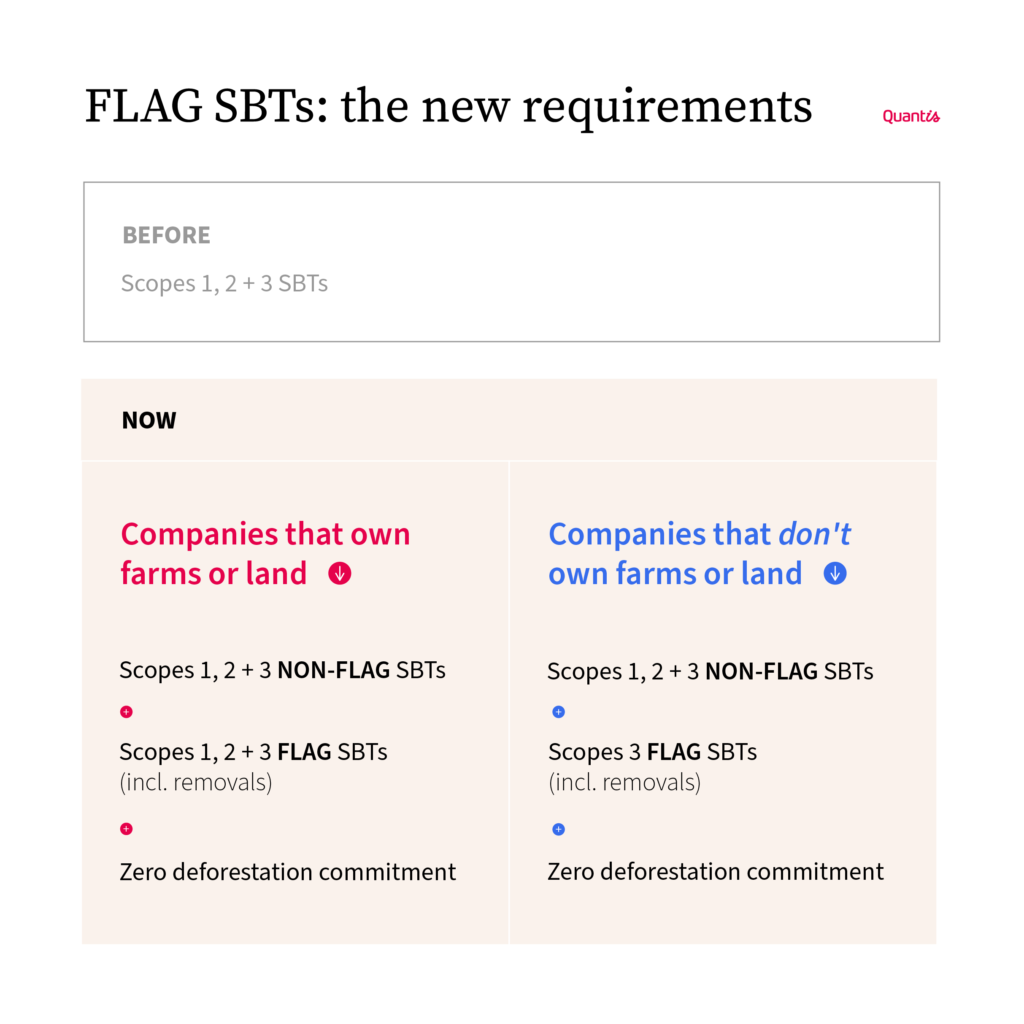
If your company has significant FLAG emissions, it’s required to set a FLAG SBT.
Does your company rely heavily on forests, land and agriculture (FLAG)? The Science Based Targets initiative (SBTi) has released new guidance to facilitate science-based target (SBT) setting for food and beverage, apparel and all other land-intensive sectors. With nearly a quarter of global GHG emissions stemming from FLAG, the SBTi FLAG guidance aims to equip companies with a standard target-setting method to accelerate the decarbonization of the global economy.
The bottom line? If your company has significant FLAG emissions, it’s required to set a FLAG SBT. Quantis helped shape the new SBTi FLAG guidance and develop the methodology. We’ve gathered all you need to know about what the new climate target-setting framework and accompanying tool mean for your business.
Sectoral pathways like FLAG enable companies to set targets that are relevant to their unique impact areas and business activities, enabling them to pursue tailored climate strategies that are more likely to succeed.
Why the SBTi’s new FLAG guidance matters
- Halving GHG emissions by 2050: Emissions from FLAG already make up nearly 25% of the global total — and agricultural production is expected to increase by 50% to feed the growing population. To keep the 1.5° target alive, FLAG emissions must be halved by 2050 (WRI, 2019).
- Clearing the path to 1.5°: While FLAG represents a significant share of emissions, it also holds the key to a number of reduction and removal opportunities. The land sector could feasibly and sustainably contribute about 30% of the global mitigation needed in 2050 to deliver on the 1.5°C target.
- Filling a critical knowledge gap: While many companies with land-intensive operations have already set SBTs, they don’t provide clarity into the specific efforts this sector requires to align with 1.5°C. This is largely due to the lack of available standards, guidance and methods, which the SBTi FLAG seeks to address.
- Taking action where it counts: Sectoral pathways like FLAG enable companies to set targets that are relevant to their specific impact areas and business activities, enabling them to pursue tailored climate strategies that are more likely to succeed.
What you need to know about the SBTi FLAG guidance
- FLAG SBTs are science-based targets that apply to a company’s forest, land, and agriculture related emissions, including CO2 emissions associated with land-use change (i.e. biomass and soil carbon losses from deforestation and forest degradation, conversion of coastal wetlands and peatland burning) and emissions from land management (i.e. N2O and CH4 from enteric fermentation, biomass burning, nutrient management, fertilizer use, and manure management; and CO2 emissions from machinery and fertilizer manufacturing).
- A company’s FLAG SBTs cover both reduction and removals — a key difference from non-FLAG SBTs — meaning that removals can, to a certain extent, be used as an abatement mechanism to reach targets. FLAG abatement, however, can’t be used to meet non-FLAG abatement targets (e.g., emissions reductions from agricultural activities can’t be used to meet facility non-FLAG targets, nor can removals from FLAG targets be used to reach non-FLAG targets).
- The SBTi FLAG guidance provides both a sector-wide pathway for companies with diversified FLAG emissions and 11 commodity-specific pathways for beef, poultry, pork, dairy, maize, wheat, rice, soy, palm oil, leather, and timber and wood fiber. Companies may combine multiple commodity pathways and the sector pathway as part of an overarching FLAG target-setting strategy.
- A FLAG target covers emissions “up to the farm gate,” meaning that all emissions occurring after the farm gate, (e.g., raw material processing), are excluded from the FLAG boundary, and should be treated as non-FLAG emissions. Companies will need to ensure their footprint reflects this distinction.
- Companies with FLAG targets must publicly commit to reaching zero deforestation across all emissions scopes by 2025 at the latest. Commitments are to be posted on the SBTi website using its language and it’s recommended to follow the Accountability Framework Initiative (AFI) guidance.
- Biogenic removals may be accounted for to meet FLAG targets. This includes agroforestry, soil carbon sequestration, forest restoration on working lands, etc. The Greenhouse Gas Protocol Land Sector and Removals Guidance, expected early 2023, will detail how to account for such removals. In the meantime, companies should move forward with target setting to accelerate action.
- Companies with significant FLAG emissions are required to set a FLAG SBT. This is particularly relevant for companies in the food and beverage industry or those with FLAG emissions that exceed 20% across scopes 1, 2 and 3.
How FLAG SBTs impact your company

New timeline requirements for target setting
Timeline requirements vary depending on where a company is in their SBT journey.
- If your company set targets before January 2020, they’ll need to be updated by the end of 2023.
- For those with an SBT set or expected after January 2020 but before April 2023, the deadline to update them is the end of 2024.
- Starting April 2023, any company who sets targets must comply with FLAG.
How to navigate FLAG guidance today
- Start by determining whether the new SBTi FLAG guidance is relevant to your company and if you’ll need to update your targets — if already set.
- If your company is required to update or set new targets, the next steps are to understand the implications for your baseline assessment, which now identifies FLAG emissions, and model various targets with the help of the SBTi FLAG target setting tool, developed with support from Quantis.
- If the new FLAG guidance creates delays in submitting your targets, ensure you keep investors informed.
Taking climate action today is critical and companies shouldn’t put existing reduction plans on hold while waiting for their FLAG targets to be publicly validated by the SBTi. Quantis looks forward to guiding clients through each step of the process, from assessing FLAG emissions to defining sector- and commodity-specific pathways, and co-creating the transformational strategies to accelerate action in the race to 1.5°C.
Related resources

Webinar
SBTi FLAG target-setting in practice – lessons learned
Join us for this webinar to learn about what the new climate target-setting framework mean for your business.

Quantis pioneers CO2 removal accounting for trees and soils
Together with soil scientists, the Cool Farm Alliance and dairy and livestock organizations, Quantis is formalizing methodological guidance for carbon sequestration accounting

Page
Land + Agriculture
Natural climate solutions leverage the power of nature to mitigate climate change, biodiversity loss, and water scarcity.


